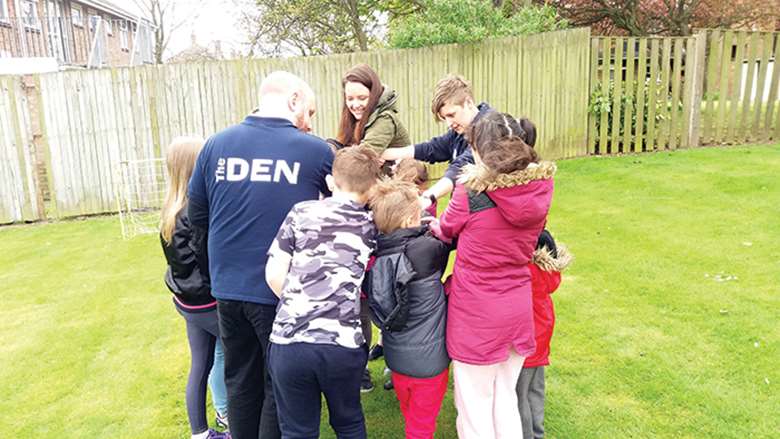Domestic violence advisory service, Blackpool
Nina Jacobs
Tuesday, October 31, 2017
The service supports children and young people aged from five to 21 experiencing domestic abuse

- Developing stronger relationships between staff and schools shows victims being identified earlier
- Support from The Den has helped young people feel that they have been listened to and believed
ACTION
Identifying a total lack of support for young people experiencing domestic abuse in Blackpool was the catalyst for an innovative pilot advisory service that began in 2009.
Before that, adult victims were being helped by health and social care charity Empowerment - a merger of Blackpool Advocacy and Lancaster District Women's Aid - through its commissioned domestic violence advice service.
Kerrie Fawcett, domestic abuse manager at The Den - the charity's dedicated children's independent domestic violence advisory (IDVA) service - says "there was just no support out there for children and young people [who had experienced domestic abuse] even though there was a huge need".
A bid for Comic Relief funding helped launch the children's IDVA service, after which a further two-year grant was awarded ensuring its place as a commissioned service in Blackpool until 2014.
Fawcett says since then, the staff team - one full-time worker in Blackpool and two posts in Fylde & Wyre - has significantly reduced, so the service can only support children and young people currently experiencing abuse.
Figures in the charity's annual report for 2014/15 revealed that the service helped 413 children and young people in that period who had experienced domestic abuse. The latest data, covering 12 months until January 2017, shows The Den supported 188 young people, 65 per cent of whom lived in Blackpool.
Fawcett says the figures for Fylde & Wyre are lower as it is a newer service.
The bulk of the service's work is with primary aged children from five to 11, but 11- to 16-year-olds are also supported, as well as young people (16 up to 21) experiencing domestic abuse in their own right.
According to Fawcett, there has been a deliberate criteria for the service to "cast its net as wide as possible around the needs of Blackpool and Fylde & Wyre to capture lots of different things".
This could include a perpetrator no longer living in the family home but still maintaining contact with family members. In such a case, the young people involved would not be referred to a multi-agency risk assessment conference (MARAC) which is used for high-risk cases.
"We try to make sure we can support as many individuals as we can who are at risk, but that wouldn't necessarily meet the threshold of MARAC," she says. Referral routes into the service are varied: the highest number of referrals in Blackpool are through children's social care (52 per cent); the most common referral route for Fylde & Wyre is via one of the area's three support services for domestic abuse (36 per cent).
In terms of practical support, six one-to-one sessions are delivered over a similar timeframe to a school term. These can either be held in an educational setting or at the young person's home, depending on their personal choice.
During the sessions, the allocated worker discusses safety planning and how to get help if further incidents were to occur.
Sessions are also held around emotional wellbeing and feelings. Any young person who experiences an increase in risk during their sessions would be offered further support by the service.
"If there were still some ongoing concerns and our involvement has ended at The Den, we would offer all the children we've supported an activity in the summer," she adds.
It is these free peer support sessions held during the summer break that Fawcett believes are invaluable to both young people and their parents.
This summer, the service took groups of children on trips to a snowboarding and ski park, providing some parents with a much needed break.
IMPACT
The impact of the service has been, in Fawcett's opinion, "massive" on children and young people in Blackpool and Fylde & Wyre.
"Children are identified earlier in schools and that's because our staff have done a lot of networking with schools to build really strong relationships," says Fawcett.
This is evidenced in the most recent data, which showed an increased referral rate from education across of The Den's two services - bringing it above the national average - reflecting the relationship-building work done by staff.
Feedback received by The Den from young people indicates that their support has enabled them to feel listened to and believed, in some cases for the first time.
"Some of them tell us they're so glad they have The Den as we're the only ones who listen," says Fawcett.
This article is part of CYP Now's special report on intrafamilial abuse. Click here for more




